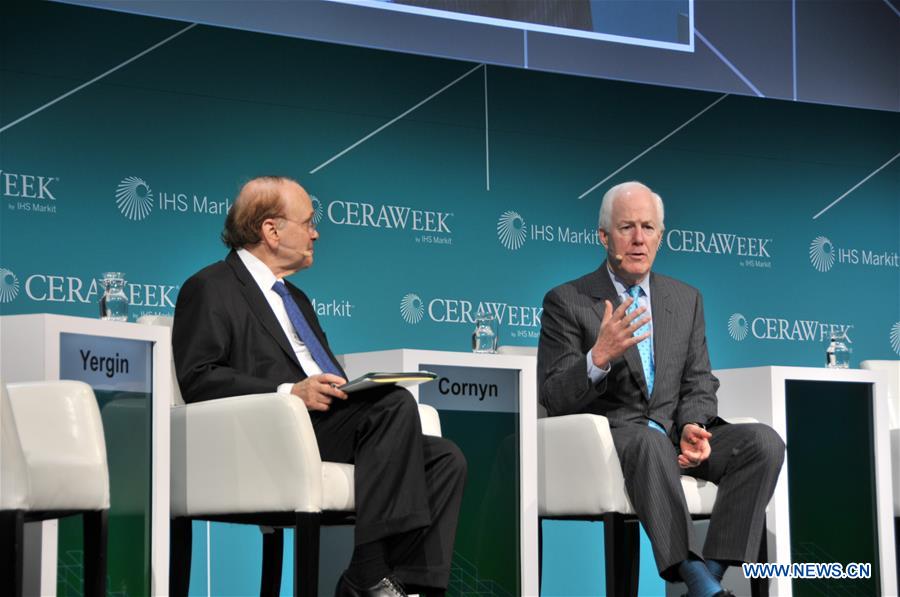 ?
?U.S. senator John Cornyn (R) speaks during a dialogue at CERAWeek conference in Houston, Texas, the United States on March 15, 2019. The United States and China need to work together to find ways for both to prosper, John Cornyn told an energy conference on Friday. The five-day CERAWeek gathered more than 4,500 guests and speakers in the energy, technology and financial sectors from more than 70 countries and regions this year. (Xinhua/Liu Liwei)
by Xinhua writers Gao Lu, Liu Liwei, Liu Yanan
HOUSTON, March 15 (Xinhua) -- China needs to enhance energy exploration, international cooperation and technology innovation to improve energy security in an era of energy transformation, International Energy Forum (IEF) Secretary General Sun Xiansheng has said.
China is having a heavy external dependence on energy at present, Sun said in an interview with Xinhua during the CERAWeek by the London-based information company IHS Markit. China has become the world's largest crude oil importer since 2017 and surpassed Japan to become the world's largest natural gas importer since the end of 2018.
In order to meet new challenges in the energy industry, China should enhance oil and gas exploration domestically to increase oil and gas output, Sun suggested.
He also pointed out that China can reinforce international cooperation in the energy field by investing and trading with other countries.
"In addition, China should further increase investment in innovation and new technologies, as well as developing and utilizing new energy like hydrogen," he added.
With strong support of the Chinese government, enterprises including China National Petroleum Corporation have made great contributions to ensuring national energy security, Sun said, adding "Projects like accessing pipelines and building liquefied Natural gas (LNG) receiving terminals have been done in order to diversify energy imports."
According to Sun, the global energy industry has entered a transforming phase due to economic development and environmental concerns.
"We are stepping into the Fourth Industrial Revolution, an inevitable stage of industrial development. Besides, climate change has become a consensus among many countries, which had a profound impact on the global economy and energy transformation," Sun said.
Sun argued that geopolitics is associated closely with energy and that the link is even more pronounced.
"U.S. sanctions against Iran may lead to a shortage of oil and gas supply. Venezuela is in turmoil and its oil production has already fallen from 4 million barrels per day to 1 million barrels per day. The Brexit issue has been dragging too long that the tension may have a huge impact on the European energy industry. These geopolitical problems will create uncertainties in the supply of energy market," he said.
Commenting on the U.S. energy development, Sun said driven by technology, shale oil has boomed in the country in recent years. "The rapid growth of shale oil transformed the U.S. from a major energy importing country to an exporting country, shaping the global landscape," he said, adding that the increase in U.S. oil output has also played a role in balancing global oil prices.
The 72-member IEF is a neutral facilitator of informal, open, informed and continuing global energy dialogue.
Accounting for around 90 percent of global supply and demand for oil and gas, it aims to foster greater mutual understanding and awareness of common energy interests among its member countries.
The 38th CERAWeek, which kicked off on Monday with an IEA press conference, is an annual energy meeting with the attendance of prominent speakers from energy, technology and financial sectors. This year's meeting was attended by more than 4,500 guests from over 70 countries and regions. (Zhang Jingyu from China Petroleum Daily contributed to the story)











